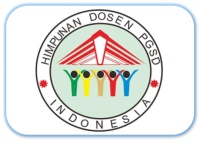PENINGKATAN HASIL BELAJAR SISWA DALAM PEMBELAJARAN IPS DENGAN TEKNIK MIND MAPPING DI KELAS V SDN 13 LEMBAH MELINTANG
Abstract
The research is motivated by the observation in the field that the IPS conducted by the teacher still predominantly use the lecture method, and not be concerned with improving all aspects of the study results IPS students have not as expected. Therefore, action is taken by using Mind Mapping techniques that the make students active and creative learning with the aim of improving the learning process so that IPS can improve learning outcomes in class V. Study, the Researchers did was action research using qualitative and quantitative approaches. This study was conducted in two cycles, each cycle held two meetings with the four stages, namely, planning, implementation, observation and reflection. The research data is in the form of information about the process and outcome measures in the Data Obtained from the observation and tests. The results Obtained by using the technique of Mind Mapping with two cycles Showed an increase of. The average assessment of learning design first cycle was 75% (quite) Increased in the second cycle to 94.6% (very good). Assessment of the implementation aspects of the teacher's first cycle was 76.3% (good) Increased in the second cycle to 88.8% (very good), and aspects of the students' first cycle was 73.8% (good) Increased in the second cycle to 93.8 % (very good). As well as student learning outcomes in the first cycle was 71.4 (average) Increased in the second cycle to 83.7 (good). Thus it can be said that the technique of Mind Mapping to improve student learning outcomes in learning social studies in Class V Lembah Malintang Elementary School 13 West Pasaman regency
Kata kunci: Peningkatan Hasil Belajar, Teknik, Mind Mapping;References
Depdiknas. 2006. Kurikulum Tingkat Satuan Pendidikan. Jakarta : Depdiknas.
E. Mulyasa. 2007. Kurikulum Tingkat Satuan Pendidikan Sebuah Panduan Praktis. Bandung: Remaja Rosdakarya
Etin, Solihatin dan Roharjo. 2007. Cooperative Learning Analisis Model Pembelajaran IPS. Jakarta: PT Bumi Aksara.
Jonathan Sarwono . 2009. Perbedaan Dasar Antara Pendekatan Kualitatif Dan Kuantitatif. Tersedia dalam. http://js.unikom.ac.id/kualitatif/beda.html, diakses16 April 2011
Hernowo. 2010. Mind Mapping. (online) http://trigoesema.wordpress.com/2010/03/27/mind-mapping-4/. diakses hari Jum’at, tanggal 4 November 2011
IGAK Wardhani. 2007. Penelitian Tindakan Kelas. Jakarta: Universitas Terbuka.
Nasution. 2003. Berbagai Pendekatan Dalam Proses Belajar Mengajar. Jakarta : Bumi Aksara
Suharsimi Arikunto. 2005. Prosedur Penelitian. Jakarta: PT. Asdi Mahasatya.
Sugiyono. 2008. Metode Penelitian Kuantatif dan Kualitatif. Bandung: PT Alberta.
Suyatno. 2009. Menjelajah Pembelajaran Inovatif. Jakarta : Masmedia Buana Pustaka.
Tatang Sunendar. Penelitian Tindakan Kelas. http://akhmadsudrajat.wordpress. com/2008/03/21/penelitian-tindakan-kelas-part-ii/. diakses 18 Januari 2012
Taufina Taufik dan Muhammadi. 2011. Mozaik pembelajaran Inovatif. Padang: Sukabina Press.
Tony Buzan. 2008. Mind Map Untuk Meningkatkan Kreativitas. Jakarta: Gramedia Pustaka Utama
Trianto. 2010. Mendesain Model Pembelajaran Inovatif-Progresif. Jakarta : Kencana.
DOI: http://dx.doi.org/10.24036/e-jipsd.v1i1.431


